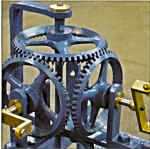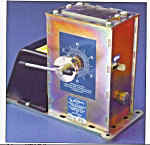 A clock bevel gear mechanism, similar to the old workings of our church clock.
A clock bevel gear mechanism, similar to the old workings of our church clock.
As many of you will now know, rather than attempt to repair the old clock mechanism, it was decided to replace the main working parts with an up to date electronically controlled unit, which should be more reliable and virtually maintenance free. For those amongst you who are interested, here’s a little more information about and from the company who were elected to carry out the restoration work, William Potts & Sons.
Electric clock movements
Smith of Derby began building electrically powered clocks around 1940, and many of these have a historical value in their own right. These units can often be refurbished and equipped with a new self-starting electric motor which conforms to present-day safety standards.
As an alternative to refurbishment, original Smith of Derby Tl movements can be replaced by a new T1R model which has been designed specially as a fully interchangeable replacement. This unit will drive through the existing “dialworks” or transmission gears to the clock hands.
Refurbished or new units can benefit from a Smith of Derby Auto Restart Unit or Inverter Charger which will overcome power failures and automatically make Summer/Winter time change adjustments.
 The picture inset right shows the type of clock unit now fitted.
The picture inset right shows the type of clock unit now fitted.
Some brief background details on the company chosen to restore the memorial clock.
Potts of Leeds
William Potts & Sons has origins from when Robert Potts was apprenticed in Darlington in 1790. His son William started the present company in 1833 in Pudsey, making jewellery, silverware, clocks, watches and turret clocks. It remained a family business until 1933 when it was amalgamated with John Smith & Sons. Five Potts engineers still work today from their Leeds base.
The Smith of Derby Group
John Smith & Sons
The origins of the John Smith & Sons clockmaking company has its roots in the older company of the first John Whitehurst. The association with Derby began in 1736 at 22 Irongate. The first John Smith was apprenticed to the 3rd generation Whitehurst. He left in 1856 to start his own company at 27 Queen Street Derby in premises rented, (later bought) from the Whitehurst family. The house had been the home of the Astronomer Royal, John Flamstead, from 1660 to 1675.
Through the years John Smith & Sons flourished and expanded through the acquisition of William Potts & Sons, Leeds, Clockmakers in 1933, J B Joyce of Whitchurch in 1965 and G & F Cope in 1984. A year later they also acquired B & H (Derby) Ltd, well known metal fabricators, to form the Smith of Derby Group.
The company’s long standing traditions are still maintained through family ownership under the Chairmanship of Nicholas Smith, the 4th generation, which almost certainly makes the Smith of Derby Group the oldest firm of family owned clockmakers in the country. In addition to traditional clock work, with five generations of handed down skills, we also specialise in architectural feature solutions incorporating movement, light, sound, water, textures, shapes, colour and character.
J B Joyce & Co., Whitchurch, Shropshire
J B Joyce is the oldest firm of tower clockmakers in the world trading since 1690, when William Joyce began making clocks. In 1834 Thomas Joyce moved to Whitchurch making clocks for churches, public buildings, and principal railway companies. In 1904, the business moved to Station Road, from where Joyce Clockmakers operate to this day. In 1965 it was purchased by John Smith & Sons, but continued to operate in its own right.
Never ending work …
Records show that in the last 25 years the Smith of Derby Group has cleaned, repaired or overhauled in excess of 8,000 mechanical clocks. They have restored over 6,000 clock dials. On an annual basis they presently attend in excess of 4,500 public and church clocks. In carrying out this routine maintenance activity in excess over 450,000 miles are driven by their team of clockmakers.
